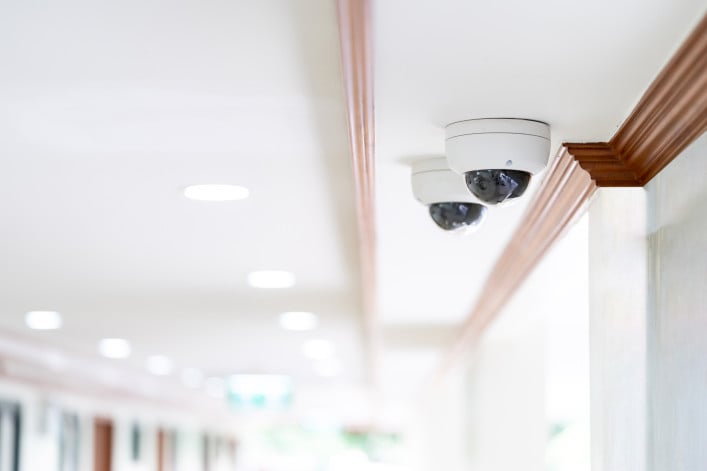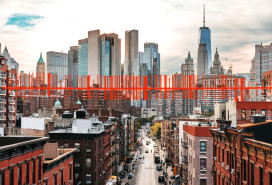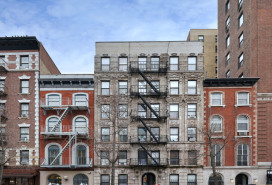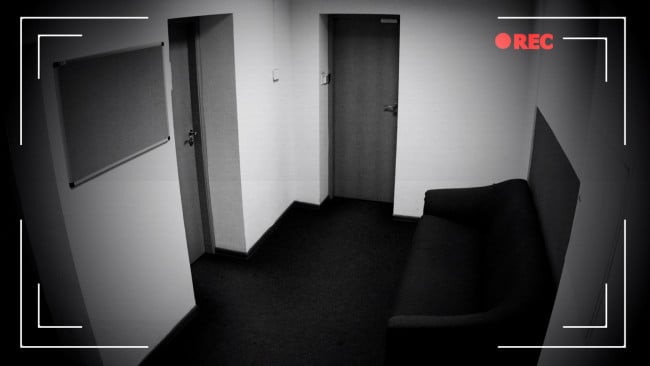Who's allowed to watch my building's security camera footage?
- Attorneys don’t recommend boards share footage with residents or view it themselves
- Most buildings limit viewing access to a security firm, property manager, and super

Footage can be viewed remotely by your building's security company or property manager.
iStock
Who typically has access to security camera footage of a condo or co-op building’s common spaces? Could the board watch it any time or just when there's been an incident? I am on the board of a NYC co-op, and we have asked our manager to look at footage to resolve a parking lot dispute, but our manager won’t do it. They also won’t let the board view it. Is that allowed?
The board could review security footage from a public area at any point, but that’s not usually how it works, according to our experts.
It’s very common for buildings to have security cameras in their shared spaces, such as the lobby and entryway. Most buildings use cameras to deter crime and will let police view footage if there is an incident at the building, says Mark Levine, principal at property manager EBMG.
“There are a lot of times where it could be a legal issue—there could be a break in or there could be something police-related—and they will come to you and ask you specifically for that information,” Levine says. “As long as the building's attorney says it's fine to give over, we will of course give it over.”
When it comes to shareholders or boards wanting to review footage, it’s a bit more complicated. Buildings tend to limit camera access to security firms or property managers, though larger buildings are more likely to have written policies outlining footage access, says Dean Roberts, an attorney at the law firm Norris McLaughlin. In general, he advises his boards not to view most camera footage, and leave it up to the security firm or property manager.
[Editor's note: A previous version of this article ran in June 2014. We are presenting it again with updated information for December 2023.]
Boards can’t watch specific units
Boards can place cameras in shared spaces, but cannot use the devices to “see” into an individual shareholder or owner’s apartment.
“[Cameras] in the lobby and the entrance are super common, but it’s not very common to have in the hallways,” Levine says. “There are personal security concerns and privacy concerns. You have to make sure that it's not specifically pointing at certain doors, and that [you’re] not spying on people.”
In general, Roberts recommends that boards don’t watch any security footage, and instead leave that job to their property manager, security firm, or super. That way, your board can’t be accused of favoritism in incidents that involve residents, such as a parking lot dispute.
That rule also prevents boards from accessing building gossip that’s frankly, none of their business.
“You also don't expect the board to be monitoring who's coming to your apartment every Friday—that's where it can get messy,” Roberts says. “Say Mrs. X’s husband goes away and every afternoon somebody shows up who's not Mr. X. That's really stuff the board doesn't need to be involved with.”
Most large buildings that Roberts works with have either discussed or written down a policy that allows certain parties to view security camera footage, but prevents the board from distributing copies.
So who is watching?
If a building has hired a third-party security firm to manage its cameras, that company would be able to access its footage, Roberts says. Oftentimes, a building will restrict access to a security firm, the building’s property manager, and potentially the on-site super.
Property managers and security companies can access a building’s footage remotely as well, rather than having to go to the property itself, Levine says. That makes it a lot easier to quickly review footage in the event of a crime—such as a package theft—and save the evidence. Most camera systems will automatically delete footage after 30 days or another set period of time, Levine says.
Your building’s manager should review the footage for your board when requested, Levine says. Your board could also demand that your property manager handover the footage, as long as you don’t have an existing policy, bylaw, or house rule that would prevent that.
Dealing with resident requests
In general, Roberts recommends that boards do not share footage with residents or even view it themselves.
He has occasionally shown shareholders footage to help resolve disputes, but will not distribute copies “without a subpoena or court order.” For example, two shareholders got into a fight in an elevator of a building he works with, and he was able to show them the footage to uncover who started the altercation and clear up the conflict.
As a property manager, Levine only shares footage when specifically requested by the board, and will ask for board approval for any shareholder requests.
“If anybody writes an email or a request that they get access to the security camera, usually it's not approved unless it's approved by the board specifically, on a case-by-case basis,” Levine says.
Earlier versions of this article contained reporting and writing by Leigh Kamping-Carder.
Trouble at home? Get your NYC apartment-dweller questions answered by an expert! Send us your questions at experts@brickunderground.com. For more Ask an Expert questions and answers, click here.
You Might Also Like


























